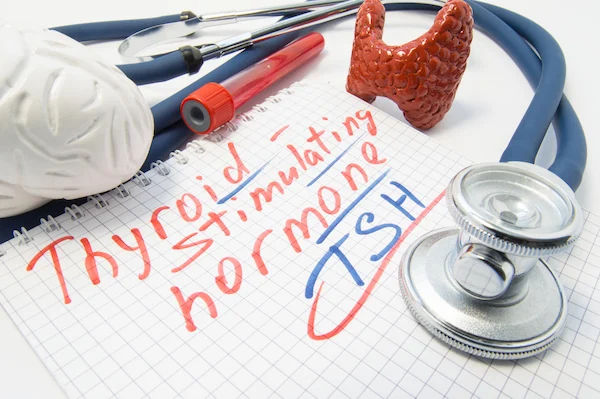Low Energy in School Kids? When a TSH Test Might Reveal the Real Reason
Persistent fatigue in children could signal an underactive thyroid. Learn how a simple TSH test can uncover hypothyroidism and help restore your child’s energy, growth, and focus.

Written by Dr. Rohinipriyanka Pondugula
Reviewed by Dr. J T Hema Pratima MBBS
Last updated on 11th Aug, 2025

It's not unusual for school-going children to feel tired. Late-night study sessions, busy schedules, and screen time can all be contributing factors. However, if your child is persistently fatigued, struggles to concentrate, or appears unusually sluggish despite sleeping well and eating correctly, it could be a red flag for an underlying health issue. One often-overlooked cause? An underactive thyroid.
Let's explore how thyroid function affects children, why checking TSH (Thyroid-Stimulating Hormone) levels is essential, and when you should consider this simple yet powerful test.
What Is the Thyroid Gland and What Does It Do?
The thyroid is a butterfly-shaped gland located at the front of the neck. It plays a key role in producing hormones, mainly T3 (triiodothyronine) and T4 (thyroxine), that control the body's metabolism. These hormones affect nearly every organ in the body, including the brain, heart, muscles, and digestive system.
In children, thyroid hormones are not only essential for maintaining energy and weight balance but also crucial for growth, brain development, and puberty.
What Is TSH and Why Is It Important?
The pituitary gland in the brain produces TSH (Thyroid-Stimulating Hormone). Its job is to instruct the thyroid gland to make T3 and T4. If the thyroid isn't making enough hormones (a condition known as hypothyroidism), the pituitary compensates by releasing more TSH.
Thus, elevated TSH levels are often the first sign that the thyroid is underactive.
How Hypothyroidism Affects Children
While adults with hypothyroidism often complain of weight gain and depression, children tend to exhibit more subtle and diverse symptoms, especially during the early stages. Some of the most common signs include:
1. Low energy or persistent tiredness
2. Poor academic performance despite effort
3. Delayed growth or short stature
4. Dry skin or brittle hair
5. Constipation
6. Puffy face or swelling around the eyes
7. Cold intolerance
8. Delayed puberty
9. Slow speech or forgetfulness
Many of these symptoms are mistaken for poor sleep, poor nutrition, laziness, or behavioural problems. In truth, they might stem from a hormonal imbalance.
Common Causes of Thyroid Dysfunction in Kids
The two most common reasons for thyroid issues in children include:
1. Congenital Hypothyroidism
Present from birth, this form is usually identified through newborn screening. If missed, it can lead to severe developmental delays.
2. Autoimmune Hypothyroidism (Hashimoto's Thyroiditis)
This condition arises when the body's immune system mistakenly attacks the thyroid gland. It is more common in girls, especially during the preteen or teenage years.
Family history of thyroid disease, other autoimmune conditions (like Type 1 diabetes or vitiligo), and iodine deficiency can also raise the risk.
When Should You Consider a TSH Test for Your Child?
A TSH test should be considered if your child exhibits any of the following:
1. Persistent fatigue or low energy
2. Unexplained weight gain
3. Slowed growth or short stature
4. Trouble concentrating or "brain fog"
5. Changes in behaviour or mood swings
6. A family history of thyroid disease
7. Delayed puberty or menstruation
8. Puffy face, dry skin, or constipation
Your paediatrician may also recommend a thyroid function test if your child has Down syndrome, Turner syndrome, or Type 1 diabetes, as these conditions are linked to a higher risk of hypothyroidism.
What Does the TSH Test Involve?
The TSH test is a simple blood test. It measures the amount of thyroid-stimulating hormone in the blood. Here's what the process typically looks like:
1. Preparation: No special fasting or restrictions are usually needed, though your doctor might advise otherwise in specific cases.
2. Sample collection: A small amount of blood is drawn from a vein, usually in the arm.
3. Time to results: Most labs deliver reports within 24–48 hours.
Depending on the TSH level, your doctor may also order additional tests like:
1. Free T4 (FT4) – To measure circulating thyroid hormone
2. Anti-TPO antibodies – To check for autoimmune thyroiditis
What Do TSH Test Results Mean?
Here's a general interpretation guideline:
However, normal ranges vary with age and between laboratories. Your paediatrician will interpret results in the context of your child's symptoms and other tests.
What Happens If the TSH Is High?
If your child's TSH levels are elevated, your doctor may diagnose subclinical or overt hypothyroidism depending on the accompanying T4 levels. Treatment typically involves:
1. Levothyroxine: A synthetic thyroid hormone taken daily
2. Regular follow-ups: TSH levels are monitored every 6–12 weeks initially, then every 6–12 months
With timely treatment, children can catch up in growth, feel more energetic, and thrive both academically and socially.
Case Scenario: Riya's Fatigue Wasn't Just Laziness
Riya, a 10-year-old bright student, began falling asleep in class and showed little interest in play. Her teachers noticed her grades slipping. Her parents assumed she was staying up too late or not eating well. But after a paediatric visit and a TSH test, Riya was diagnosed with hypothyroidism.
Within a few weeks of starting medication, her energy levels returned, and her confidence soared.
Moral? It's important not to dismiss a child's fatigue; sometimes the cause lies deeper than it seems.
Why Early Testing Matters
Untreated hypothyroidism in children can lead to:
1. Learning disabilities
2. Delayed physical growth
3. Irregular puberty
4. Low self-esteem
5. Emotional problems
Early diagnosis through a TSH blood test can help avoid these complications and improve your child's quality of life.
Is TSH Testing Safe?
Absolutely. It's a routine, low-risk test with no significant side effects. Some children may experience mild discomfort or bruising at the needle site, but this usually resolves quickly.
Tips for Parents
1. Trust your instincts: If your child seems unusually tired or slow, consult your doctor.
2. Don't self-diagnose: Many thyroid symptoms overlap with other conditions. Testing is the only reliable way to know.
3. Please keep track of changes: Note when your child's symptoms began and whether they are worsening.
4. Ask about thyroid screening, especially if thyroid issues run in the family.
Want to Book a TSH Test Online?
Skipping the lab visit is now easier than ever. Platforms like Apollo 24|7 offer hassle-free at-home testing:
- Book online in seconds
- Get samples collected at home
- Receive reports digitally within 24–48 hours
- Schedule follow-up consultations if needed
Schedule an Assessment and Get Your Health Checked
Final Thoughts
If your child often feels tired, cold, or mentally foggy, it might not be just a phase. Thyroid hormone imbalance could be the silent reason behind their low energy levels.
A quick TSH test can provide vital clues, and the earlier you uncover the problem, the easier it is to manage. So don't overlook persistent fatigue or academic decline in children. Trust your gut, talk to your paediatrician, and consider testing.
After all, your child deserves to feel energetic, happy, and ready to take on the world.





